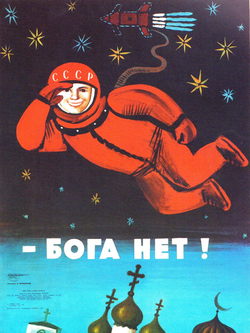More languages
More actions

State atheism was adopted by Marxist–Leninist socialist states throughout the 20th century. It started in the Soviet Union as a response to the theocracy of the Russian Orthodox Church under the tsar and was meant to promote a more secular and atheistic society. Other Marxist-Leninist states (such as Cuba and Albania) adopted this line in the 20th century, but today the concept is controversial among many Marxist–Leninists, who felt it unfairly targeted various religious groups. State atheism is still practiced in China, Vietnam and the DPRK, although religion is not repressed in these countries. China in particular regards the forceful suppression of religion to be a deviation from the party line.[1]
Korean leaders Kim Il-sung and Kim Jong-il popularized the phrase "The people are my God" as a democratic and people-centered alternative to a state religion.[2]
References[edit | edit source]
- ↑ “During the “Cultural Revolution” especially, the antirevolutionary Lin Biao-Jiang Qing clique had ulterior motives in making use of these leftist errors, and wantonly trampled upon the scientific theory of Marxism-Leninism and Mao Zedong Thought concerning the religious question. They totally repudiated the Party’s correct policy toward religion in effect since the founding of the People’s Republic. They basically did away with the work the Party had done on the religious question. They forcibly forbade normal religious activities by the mass of religious believers, as “targets for dictatorship,” and fabricated a host of wrongs and injustices which they pinned upon these religious personages. They even misinterpreted some customs and practices of the ethnic minorities as religious superstition, which they then forcibly prohibited. In some places, they even repressed the mass of religious believers, and destroyed ethnic unity. They used violent measures against religion which forced religious movements underground, with the result that they made some headway because of the disorganized state of affairs.”
Central Committee of the Communist Party of China (1982). The Basic Viewpoint and Policy on the Religious Question during Our Country's Socialist Period. [PDF] - ↑ 14th Supreme People's Assembly (2019). Socialist Constitution of the Democratic People's Republic of Korea: 'Preamble'.
